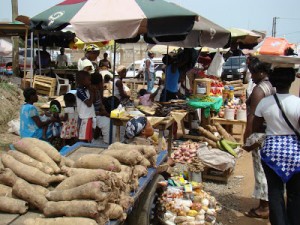Ghana’s economic growth falls below Sub-Saharan Africa average – ISSER
 A new report says Ghana’s economic growth in 2014 fell to 4.2 per cent, below the target of 7.1 and the Sub-Saharan Africa average of 5 per cent despite a 0.4 per cent growth in the global economy.
A new report says Ghana’s economic growth in 2014 fell to 4.2 per cent, below the target of 7.1 and the Sub-Saharan Africa average of 5 per cent despite a 0.4 per cent growth in the global economy.
This is according to the 2014 “State of the Ghanaian Economy Report”, a flagship report of the University of Ghana’s Institute of Social, Statistical and Economic Research (ISSER).
The report which was released on Wednesday September 9, 2015, attributes Ghana’s decline in economic growth to falling oil and commodity prices, high interest on credit and the low growth of India and China, the latter which has important trade relations with Africa.
The report says the fiscal deficit target of 8.8 per cent of GDP, was not met. Deficit fell from 10.9 per cent of GDP the previous year to 9.8, and is even so, attributable entirely to an increase in government revenue from 16 per cent of GDP to 17.7 per cent, rather than a reduction in public expenditure.
The end of year inflation rate also rose in 2014 to 17 per cent, from 13.5 per cent in 2013, missing the target of 2 plus or minus 9.5 per cent.
Professor Felix Asante, the Director of ISSER said the services sector, industry and agriculture all experienced a decline in growth: the service sector saw a fall in growth rate from 10 per cent to 5.6 per cent, industry saw growth fall from 6.6 per cent in 2013 to 0.8 per cent, and agriculture fell from a 5.7 per cent growth rate in 2013 to 4.6 per cent.
The information and communications sub-sector and the financial and insurance sub-sector were the best performing in the services sector, and the mining, quarrying and oil sub-sector was the best performing in industry.
Crops had the best performance in agriculture while fisheries was the worst performing sub-sector.
The 2014 State of the Economy report features a special chapter on infrastructure, with attention to power, road and transport, water and environmental sanitation.
Going forward, Professor Asante said government must pay attention to non-oil economic growth, address the infrastructure gap, energy crisis, the high interest rates on credit for the private sector and avoid over-taxing.
He also suggested that government address the domestic fiscal and external current account deficits, and keep public debt at sustainable thresholds particularly as falling crude and commodity prices could continue to drive depreciation of the cedi and subsequently increase the value of foreign-denominated debt.
By Emmanuel Odonkor
